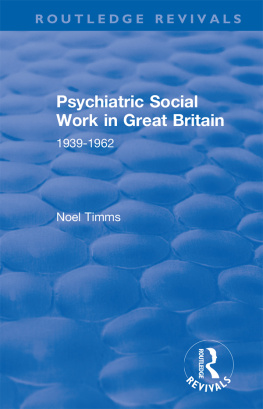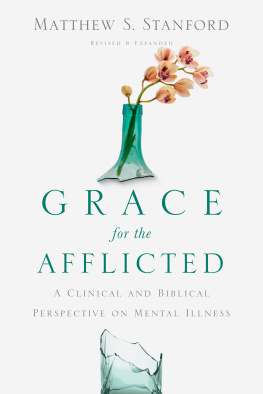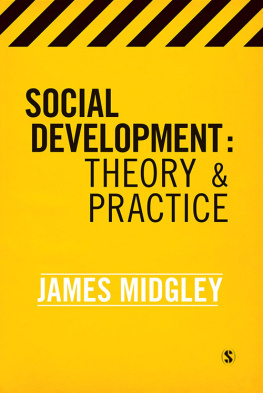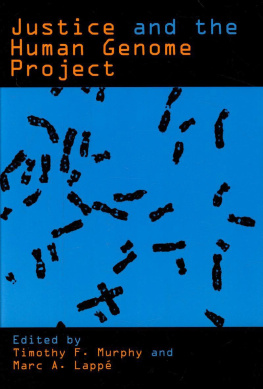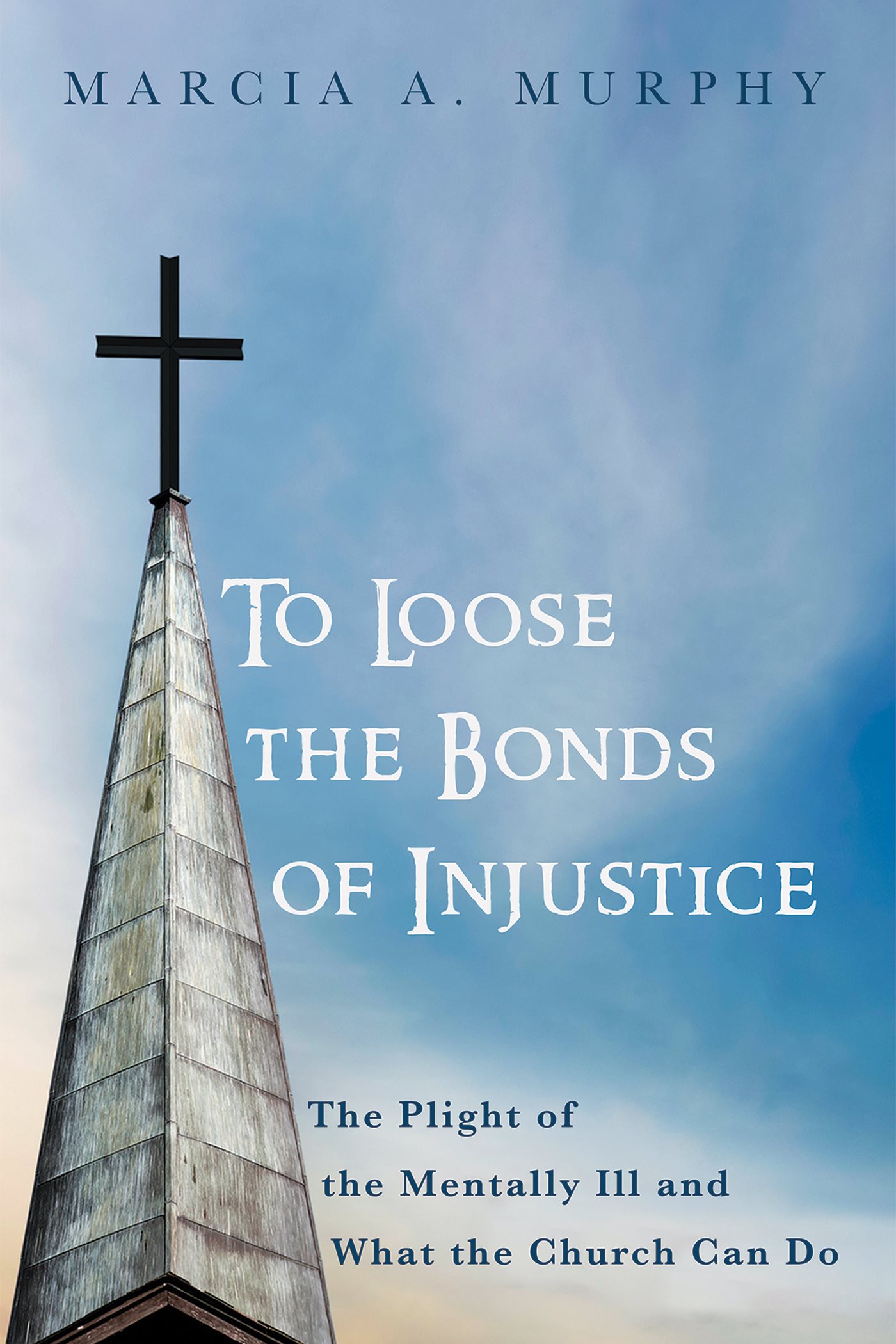In her first book, Voices in the Rain , Marcia Murphy gives an account of her struggle with serious mental illness. In this one, she tells what it is like to be stigmatized and victimized on account of such illness. But her suffering has brought her closer to God and shown her what we all must do to show compassion and correct injustice of this sort. Hers is a rare and powerful voice, one worth listening to.
Russell Noyes Jr. , MD, University of Iowa
Marcia Murphys new book is a clarion call to all faith communities to take seriously their ministry to mentally ill persons in their midst and community. Her testament to the power of faith in healing challenges each of us to daily live our faith in acts of compassion and justice that touch this often-invisible population. Read it, learn, weep, and then act to reach out in love.
Mark W. Martin , Honorably Retired, Presbyterian Church, U.S.A.
This remarkable book should be on the reading list of all mental health professionals and mental health policy makers. It describes in rich detail how current mental health policy and treatment standards impact intricate aspects of the day-to-day life of someone suffering mental illness... Fortunately, Murphy has strong faith and a supportive faith community. This strength also allows her to portray accurately the struggles she faces in light of our inhumane treatment of people suffering mental illness.
Carolyn L. Turvey , PhD, University of Iowa College of Medicine
Marcia Murphy presents an insightful examination of the societal roots of injustices experienced by persons with mental illness. She gives an inside view of the effect that they, along with mental health policies and services, have on their daily lives. Thankfully, she is able to provide a light in this darkness. With her faith and faith community playing integral roles, she found a model of care that restores dignity and human rights to the mentally ill, which she offers to us all.
Del D. Miller , MD, University of Iowa, Carver College of Medicine
To Loose the Bonds of Injustice
The Plight of the Mentally Ill & What the Church Can Do
Marcia A. Murphy
To some whom I have witnessed, with great courage and sacrifice, have been standing in the breach: Russell Noyes Jr., MD (Lutheran), Del Miller, MD, PharmD (Mennonite), Scott Temple, PhD (Jewish), Scott Grau, PhD (Jewish), Timothy H. Little, DMin, (Presbyterian), Phillip Cary, PhD (Episcopalian), Fr. Jeff Belger, MDiv (Roman Catholic), and Daniel R. Stout, MA (Lutheran).
May their labors be not in vain....
Is not this the fast that I choose:
to loose the bonds of injustice,
to undo the thongs of the yoke,
to let the oppressed go free,
and to break every yoke?
Is it not to share your bread with the hungry,
and bring the homeless poor into your house;
when you see the naked, to cover them,
and not to hide yourself from your own kin?...
If you remove the yoke from among you,
the pointing of the finger, the speaking of evil,
if you offer your food to the hungry
and satisfy the needs of the afflicted,
then your light shall rise in the darkness
and your gloom be like the noonday...
Your ancient ruins shall be rebuilt;
you shall raise up the foundations of many generations;
you shall be called the repairer of the breach,
the restorer of streets to live in.
Isaiah :, b, (NRSV)
Acknowledgments
T he individuals of the Prayer Ministry of St. Andrew Presbyterian Church have been an invaluable part of my life with their generous support of my ministry work and programs over the years. The great compassion and power of this vital group of diverse men and women that has lifted up my work, and sometimes my personal health, for Gods blessing and fruitfulness has been a dynamic force without which I never would have made it. Without their persistent, loving prayers I could not have done as much or been as effective. I am constantly reminded of how sacrificial and supportive this group has been and continues to be; I owe them a big thank you.
I also wish to express my gratitude to Jeff Charis-Carlson and Myrna Farraj for their excellent editorial suggestions. Thank you for all youve done to assist me in this work.
Authors Note
T his is a work of nonfiction; however, in order to protect the privacy of individuals involved some names, characteristics, and locations have been altered. The exceptions are names of prominent figures and institutions which are known to the public.
Introduction
I am a Christian who has lived the life of a mental patient in the United States during the period between the closures of the big institutions in the 1950 s and the advent of community care-based treatments. My new book, To Loose the Bonds of Injustice, is an inside view of the deplorable conditions faced by people who experience mental illness and the vital role the church and society must play to counteract those conditions.
This book builds upon the insights provided in my earlier memoir, Voices in the Rain: Meaning in Psychosis, in which I shared my story of what it was like to have a psychosis, post-traumatic stress disorder, and clinical depression. I described my experience with mental illness through which I found spiritual meaning and, ultimately, God. Please refer back to Voices in the Rain for information on my experience of psychiatric disability and the importance of religious faith in the recovery process.
As I am in a stable condition it would be very easy to simply sit back and relax, letting the box fan cool me in a luxurious indifference as I sip my iced tea, blocking out from my memory the drama of my adult life as well as how it is for the vast majority of people with psychiatric disabilities, many of whom are struggling to survive and are on the streets.
To Loose the Bonds of Injustice is my initiative to inform and educate others about social justice issues of mental health. I share my experiences, reflections, observations and interpretations. Instead of an academic look from the outside, this is an inside view of someone who has a lot to say about the issues that prevent people who have a mental illness from living full and productive lives.
Efforts at reform go back several centuries. In the 1800 s Dorothea Dix led a movement to release mentally ill people unjustly held in jails and alms houses or who were homeless, and instigated the building of large mental institutions. These institutions, however, only resulted in warehousing the ill under deplorable conditions without any treatments providedlargely, because no treatments were available.
Conditions worsened over the next half century, even as conscientious objectors were given the opportunity during the world wars to work in mental institutions rather than be deployed for combat. One such objector, Frank L. Wright, Jr., provided eye witness accounts of the deprivation and suffering within institutional walls:
In my heart were thousands of mental patients and their families, many of whom I had come to know personally, whose anguish and bafflement knew no bounds. And in my mind were the millions of Americans who know so little, and therefore care so little, about those forgotten thousands who are in our mental hospitals.
Such inhumane conditions, combined with doctors who thought the patients as less than human, led to the point that they created barbaric procedures to remove the frontal lobes of their patients brains. The proceduresgraphically depicted in the 2008 film, The Lobotomist were performed in at least fifty state asylums often without patients consent or foreknowledge. The results were devastating. Such abuse was legitimized by the medical industry, championed by Walter Freeman, a neurologist, until it became public knowledge and an outcry against it halted such actions. Freeman was decried a moral monster


